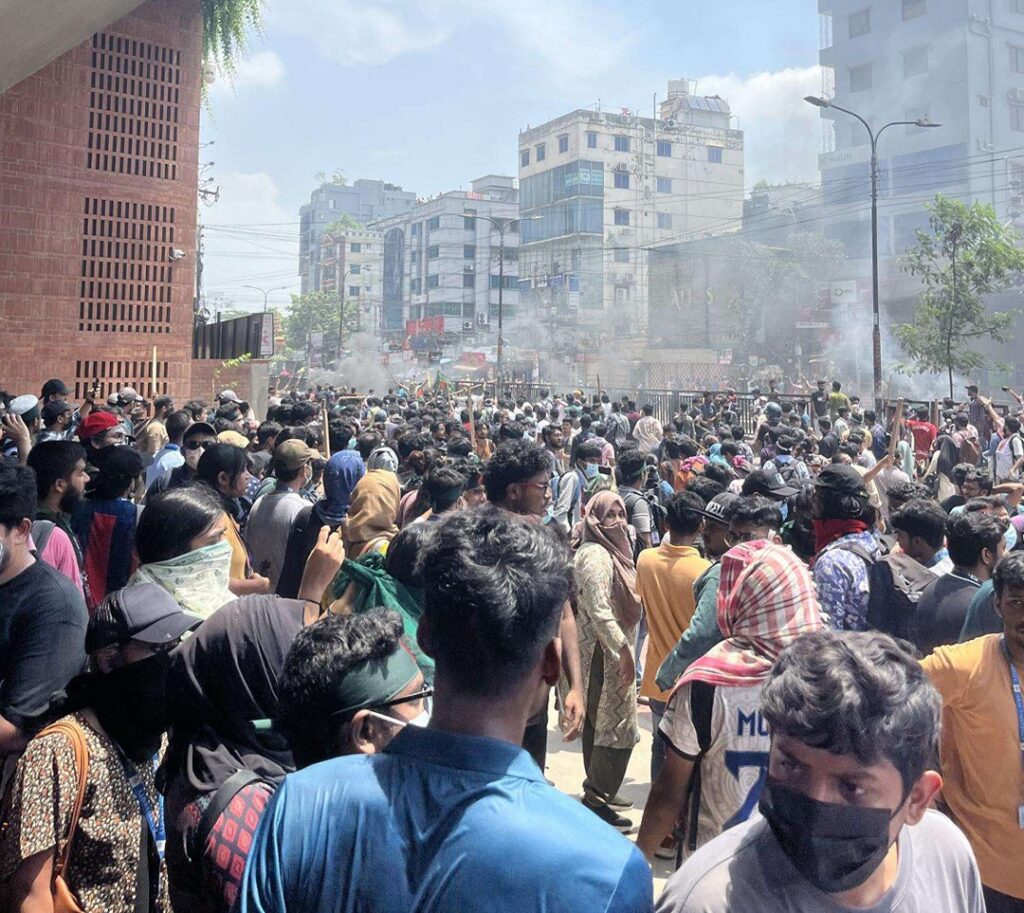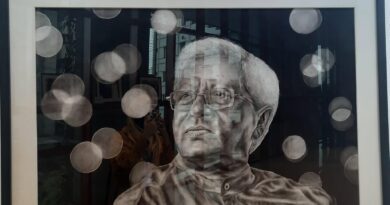BracU turned into a fortress of resistance
Note: This is a personal account of one of our journalists who joined the BracU protest of 18th July.
As I write this, I am simultaneously counting the number of my brothers and sisters martyred today by law enforcement forces. The toll is overwhelming, to the point where I feel I have forgotten how to count. Today, my beloved campus was blood-soaked; a college student died inside BracU. The government has blood on its hands, and it must be held accountable for this atrocity. I do not know how or when, but justice must prevail.
As I tried to reach the campus, I saw students from nearby colleges and universities guarding the pocket gate and the surrounding area. Upon entering the campus, I was immediately disoriented by the air filled with tear gas. Gathering myself, I witnessed the tremendous resistance put forth by the students. I had learned the previous night that applying toothpaste under the eyes can help mitigate the effects of tear gas, but I never imagined I had to see it firsthand. Faces covered with toothpaste became a common sight. I heard someone shout, “Those exposed to tear gas, come in front of the multipurpose hall; a fire is arranged there.” The smoke from the fire also helps with the gas.
What I have seen and read in movies and documentaries unfolded before my eyes today. My beloved campus had turned into a warzone. Injured people from the frontline were resting on the ground floor. Nurses and peers treated them, while others distributed food and supplies donated by nearby shops and organizations. The open space in front of the multipurpose hall became the gathering place where everyone decided the next course of action. BracU was no longer a mere campus. It had turned into a makeshift hospital, a camp, and a frontline all at once.
Despite feeling disoriented, I found comfort in seeing friends, and classmates who were there with pipes, rods, and laathis—the makeshift weapons for self-defense. They updated me on the morning’s events: the horrific and unjust attack by the police on their peaceful gathering.
Early in the morning, rubber bullets and tear gas shells were fired at the students. As they retreated inside the campus, the police continued firing from outside the gate. Eventually, the police had to back off. Students from East West University and other nearby colleges came to aid, establishing blockades on the road. A heavy clash with the police ensued, with many students hit by police fire.
The medical center was overwhelmed with injured students from BracU and other institutions. The lobby on the first floor was filled with ailing students and nurses treating them. BracU was apparently the only institution that opened its gates for students today and kept the medical center operational. Medical supplies, including oxygen cylinders, were brought in, and teams of doctors from United Medical College and other hospitals arrived to assist.
I stepped outside to witness the situation. The road stood as a witness to the atrocities inflicted upon the students. Yet, the students remained steadfast, standing like brave warriors—gamchas on their faces, toothpaste beneath their eyes, holding laathis—fearless, reminiscent of scenes from the liberation war. I saw female students sitting on the road chanting, “Dictator! Dictator!” A nearby banner read, “Police, tui kar dalal” (Police, whose lackey are you?).
I met with many faculty members, whose presence alone brought courage to the students. Multiple deans and chairpersons actively communicated with students to ensure their safety, repeatedly assuring them that no armed forces would be allowed to enter the campus premises. They exemplified what it means to be teachers and guardians.

I spoke with a severely injured student from East West University who barely survived a direct clash with the police. He had lost everything—his phone, wallet, ID card, and even his shirt. I also met a BracU student whose body was a canvas of agony, covered with the brutal marks left by rubber bullets; he had been hit more than ten times.
Armed police against unarmed university students! And what was their crime?
The students merely wanted to pray for their peers who had been slain in earlier days of the protests. Yet, amidst the suffocating tear gas and the relentless barrage of bullets, no prayers could be said today.
The violence had drowned out their voices, and the air was thick with sorrow and despair. Many students have fallen today, and many more are severely injured. But no one is afraid, nor are they backing down. Today, they were no longer mere students; they had become the very face of Bangladesh.





